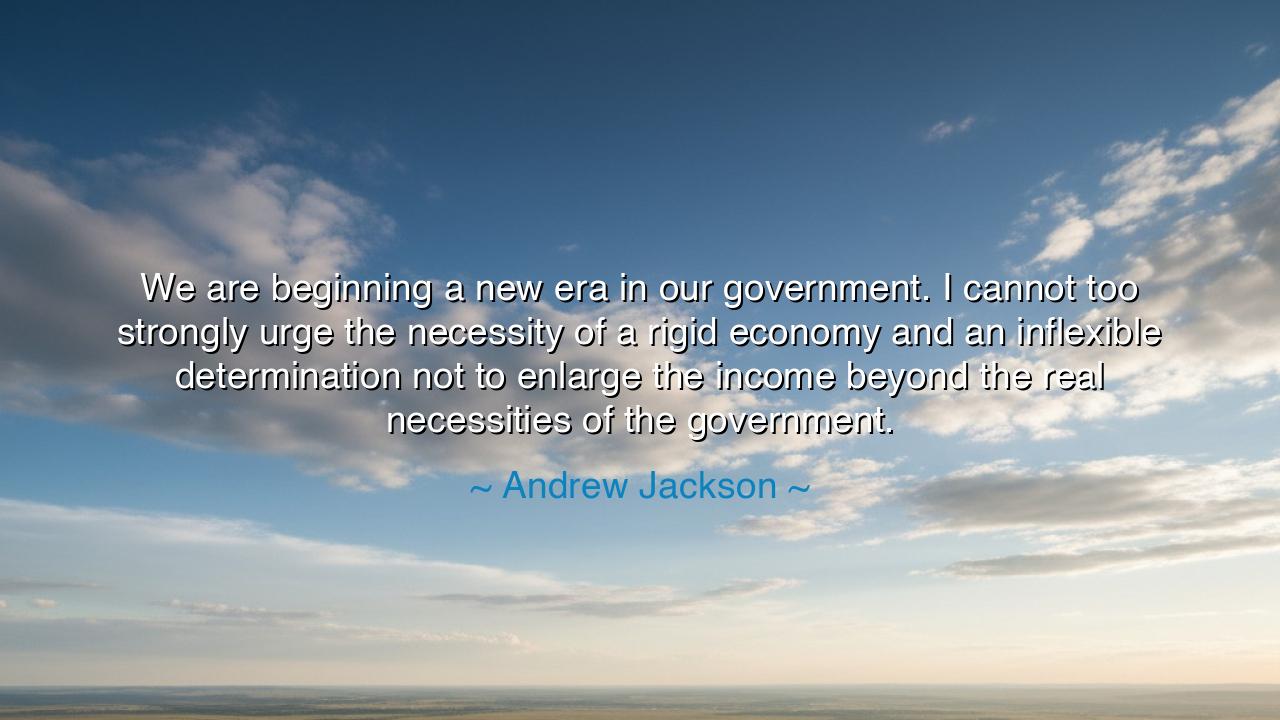
We are beginning a new era in our government. I cannot too
We are beginning a new era in our government. I cannot too strongly urge the necessity of a rigid economy and an inflexible determination not to enlarge the income beyond the real necessities of the government.






The words of Andrew Jackson, seventh President of the United States, echo with the stern voice of duty and the grave wisdom of a man who knew the weight of power: “We are beginning a new era in our government. I cannot too strongly urge the necessity of a rigid economy and an inflexible determination not to enlarge the income beyond the real necessities of the government.” Spoken in an age when the young republic still trembled between freedom and folly, these words stand as a timeless commandment against the corruption of excess. Jackson, a man of the frontier and the battlefield, understood that the strength of a nation lies not in its wealth, but in its discipline—and that the moment a government spends beyond its means, it begins to lose both its virtue and its liberty.
At the heart of this quote lies a profound moral truth: economy is not mere thrift—it is self-control. A government that demands more from its people than necessity requires is one that has begun to forget its purpose. Jackson feared not poverty, but decadence. He had seen, in his lifetime, the creeping rot that comes when leaders use the treasury not for justice or defense, but for luxury, favoritism, and gain. His call for a “rigid economy” was not the voice of miserliness—it was the cry of a guardian watching over the fragile temple of democracy. For in his eyes, every coin wasted by government was a coin stolen from the labor of free men.
To understand the origin of these words, one must remember the era of Jacksonian reform. It was a time when the new American Republic stood between prosperity and peril. The nation’s finances had grown entangled with powerful banking interests—the Second Bank of the United States, a mighty institution that Jackson believed served the rich at the expense of the common citizen. When he took office, he resolved to break this power and return control of the nation’s money to the people. His insistence on financial restraint, on refusing to “enlarge the income” of government, was born from this same conviction: that liberty cannot survive if the state becomes addicted to wealth. He believed the government must live within its means just as the people must, or else freedom itself would drown in debt.
History offers a striking vindication of Jackson’s philosophy. In 1835, under his administration, the United States accomplished something no other generation has since repeated—it paid off the national debt entirely. It was a moment of rare purity in governance, a symbol of what can be achieved when a nation governs itself with humility and purpose. Yet this triumph was not celebrated by all. Powerful elites resisted, preferring a government that borrowed endlessly, so they might profit from its obligations. But Jackson’s determination was unshaken. He declared that debt was the “national curse,” a tool by which the few enslaved the many. His words remind us that freedom and debt cannot long dwell together, whether in the life of a man or a nation.
Beneath the surface of Jackson’s warning lies a spiritual lesson: that discipline is the foundation of endurance. Whether in government or in the soul, unchecked desire leads to ruin. To live beyond necessity is to sow the seeds of collapse. The ancients knew this well. The grandeur of Rome fell not from foreign invasion alone, but from the luxury of its rulers and the greed of its classes. What began as a republic of farmers and soldiers ended as an empire of spenders and slaves. So too, Jackson feared, would America fall if it abandoned moderation for indulgence—if it forgot that the purpose of government is not to indulge appetite, but to preserve liberty.
His wisdom speaks beyond the halls of state; it speaks to every citizen. For the principles of economy, restraint, and humility apply not only to governments but to the hearts of men. When individuals learn to master their desires—to spend only on what is needed, to work before they take, to serve before they command—they mirror the same virtue that keeps a nation strong. Every man and woman who lives within their means becomes, in a sense, a guardian of the Republic. A self-disciplined people cannot be enslaved; only those addicted to excess can be ruled by debt and deception.
So let the lesson of Jackson’s words endure: prosperity without restraint is decay in disguise. Whether in the treasury of a nation or the life of a single person, wealth ungoverned soon corrupts. Be wary of the voice that tells you the government can give without taking, that it can spend without consequence, that it can protect without cost. Such promises are the lullabies of decline. The truest wealth of a nation is not its gold or its goods, but its moral strength—its courage to live within the bounds of necessity and to reject the seductions of endless consumption.
Therefore, live as Jackson taught: with rigid economy and inflexible determination, not from fear, but from wisdom. Let prudence guide your choices; let necessity, not vanity, shape your desires. In this way, both the citizen and the state may remain free—unburdened by excess, uncorrupted by greed, and strong enough to meet every storm with honor. For as long as men remember that moderation is the guardian of liberty, the republic will endure, and the spirit of Andrew Jackson will not have spoken in vain.






AAdministratorAdministrator
Welcome, honored guests. Please leave a comment, we will respond soon